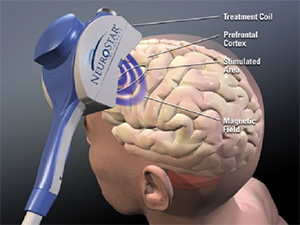The NeuroStar Transcranial Magnetic Stimulation (TMS) Therapy system is a non-invasive, non-drug medical device cleared by the U.S. Food and Drug Administration (FDA) for the treatment of Major Depressive Disorder.* NeuroStar TMS Therapy is a 37-minute outpatient procedure that is performed under the supervision of a psychiatrist. It does not require anesthesia or sedation, and patients remain awake and alert during the procedure. The treatment is administered daily for 4-6 weeks.
How NeuroStar TMS Therapy Works
 NeuroStar TMS Therapy is a non-invasive medical treatment performed in a psychiatrist’s office. During the session, the patient is wide-awake while the treating clinician uses a treatment coil to deliver focused magnetic stimulation directly to the area of the brain thought to be involved with regulating mood. The magnetic field pulses of NeuroStar TMS Therapy are the same strength as those used in magnetic resonance imaging (MRI) machines.
NeuroStar TMS Therapy is a non-invasive medical treatment performed in a psychiatrist’s office. During the session, the patient is wide-awake while the treating clinician uses a treatment coil to deliver focused magnetic stimulation directly to the area of the brain thought to be involved with regulating mood. The magnetic field pulses of NeuroStar TMS Therapy are the same strength as those used in magnetic resonance imaging (MRI) machines.
The nature of the magnetic field allows it to pass through a patient’s hair, skin, and skull and into the mood-regulating area of the brain. This method allows for targeted stimulation, minimizing the stimulation of brain tissue not involved in mood.
These magnetic pulses produce very small electrical currents. The amount of electricity created in the brain is very small and cannot be felt by a patient. These small electric currents can cause the neurons (brain cells) to fire or become active and lead to the release of neurotransmitters (the brain’s chemical messengers).
Clinical Data1
NeuroStar TMS Therapy was evaluated for efficacy, safety, and tolerability in the acute treatment of major depression in patients who had failed to receive benefit from prior antidepressant medications. A six-week, randomized, placebo-controlled, double-blind study was conducted to evaluate the use of NeuroStar TMS as a monotherapy. An analysis for predictors of response demonstrated that the patients with the best response to NeuroStar TMS Therapy were those who had not benefited from one prior antidepressant medication at an adequate dose and duration in the current depressive episode.
This clinical study population was comprised of patients with unipolar, non-psychotic major depressive disorder. Almost all of them (97%) had suffered previous depression episodes. These patients also had an extensive treatment history without satisfactory improvement. They had received a median of 4 total prior antidepressant treatment attempts in the current episode, one of which achieved treatment adequacy at or above the minimal effective dose and duration. Thirty-five percent of the patients had a co-morbid anxiety disorder and all had moderate to severe depressive symptoms.
In the indicated patient population, the following efficacy results were observed in the randomized, controlled study:
- The primary efficacy measure, the Montgomery-Asberg Depression Rating Scale (MADRS) symptom score change at four weeks, was statistically significant compared to placebo (p=0.0006), for NeuroStar-treated patients. Similar results were observed with the Hamilton Depression Rating Scale (HAMD).
- NeuroStar TMS Therapy-treated patients had statistically significant response and remission rates, which were approximately twice the rate of placebo-treated patients.
In an open-label clinical trial, which is most like real-world practice, 1 in 2 patients suffering with depression improved significantly, and 1 in 3 patients were completely free of depression symptoms after six weeks of treatment.
Safety
Throughout NeuroStar TMS Therapy studies, more than 10,000 active TMS treatments were safely performed, with the following safety results observed2:
- No systemic side effects commonly associated with antidepressant medications
- No adverse effects on concentration or memory
- The most common side effects reported during clinical trials were headache and scalp pain or discomfort — generally mild to moderate and occurring less frequently after the first week of treatment.
- There is a low risk of seizure associated with TMS Therapy. The estimated risk of seizure under ordinary clinical use is approximately 1 in 30,000 treatments (0.003% of treatments) or 1 in 1000 patients (0.1% of patients). No seizures were observed during NeuroStar clinical trials.
- During clinical trials, there was a less than 5 percent discontinuation rate due to adverse events.
For more information on TMS Therapy visit abarishealth.com/tms-therapy-for-depression
NeuroStar TMS Therapy is contraindicated in patients with implanted metallic devices or non-removable metallic objects in or around the head. As with any antidepressant treatment, patients should be monitored for symptoms of worsening depression.
*NeuroStar TMS Therapy is indicated for the treatment of major depressive disorder in adult patients who have failed to achieve satisfactory improvement from one prior antidepressant medication at or above the minimal effective dose and duration in the current episode. NeuroStar TMS Therapy is available by prescription only and may not be right for everyone. For full prescribing and safety information, visit www.neurostar.com.

